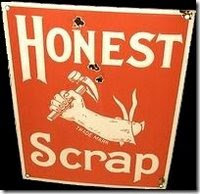 Steve Ward returns with a new band after a ten-year hiatus –
A review in three parts
Steve Ward returns with a new band after a ten-year hiatus –
A review in three partsTo save time and effort for anyone who recognizes the names "Cherry Twister" or "Steve Ward":
Run - don't walk, RUN - out and buy the new album by a band called Fauna Flora.
For the rest of humanity:
Thirteen months ago, a new band out of southeastern Pennsylvania, Fauna Flora, released its debut album with little fanfare. Even pop-music lovers who might recognize the names from paragraph one were most likely unaware that the best-kept secret in singer-songwriters since Sixto Rodriguez had released his first new music in over ten years. Released in April 2014, Fauna Flora features 11 new songs written and produced by Ward and featuring a group of supporting players whose names will be familiar to those happy few in possession of his solo albums and earlier work as Cherry Twister. With Paul Murr (drums & percussion) and Matt Thomas (keyboards), who appeared on the solo albums in 2000 & 2003, as well as Joe Pisapia (bass & pedal steel guitars, backing vocals - his work with Steve goes back to the first Cherry Twister record in 1993), Fauna Flora doesn't sound or feel like a debut album - but the work of a maturing artist supported by a rock-solid team.
Fauna Flora is infectious pop music with memorable melodies
and delicious harmonies tinged with just enough sweet melancholy to give the
whole package some emotional heft. Ward’s guitar work remains top notch,
never flashy but always serving the song, and his voice, though retaining a
beautifully delicate quality, has grown stronger and more assured over
time. After repeated listening, the vocals reminded me more and more of
one of pop music’s finest tenors – Art Garfunkel. Run – don’t walk, RUN –
out and buy Fauna Flora’s debut album.
For that portion of humanity that would like to read more
about Fauna Flora before buying the album:
Although the temptation is strong to speculate on the life behind the work when a musician disappears from the scene for such an extended period, Fauna Flora seems a very natural progression from Ward's most recent solo work, See and Be Seen, in 2003. Perhaps the phrase "disappears from the scene" isn't appropriate for a musician that has not yet penetrated the popular consciousness - but this is music deserving of greater attention. The guy who had to deal with a duplicitous paramour in "Kid Yourself", the devastating closer from that fine album, has seemingly taken up residence with the object of his affections - but the course of true love remains uneven. "The Mansard Roof and the Maple Tree" opens the new album with a lovely acoustic guitar figure and Ward's high tenor setting the scene and foretelling the future all at once: "I made my home west of Lancaster / on the road that took me far from her." “The Belle of Blue Road” seems to again reference this lost lover (“Everything that’s beautiful, she understands” harkens back to the line from “Kid Yourself” – “She only wants her beautiful”).
Although the temptation is strong to speculate on the life behind the work when a musician disappears from the scene for such an extended period, Fauna Flora seems a very natural progression from Ward's most recent solo work, See and Be Seen, in 2003. Perhaps the phrase "disappears from the scene" isn't appropriate for a musician that has not yet penetrated the popular consciousness - but this is music deserving of greater attention. The guy who had to deal with a duplicitous paramour in "Kid Yourself", the devastating closer from that fine album, has seemingly taken up residence with the object of his affections - but the course of true love remains uneven. "The Mansard Roof and the Maple Tree" opens the new album with a lovely acoustic guitar figure and Ward's high tenor setting the scene and foretelling the future all at once: "I made my home west of Lancaster / on the road that took me far from her." “The Belle of Blue Road” seems to again reference this lost lover (“Everything that’s beautiful, she understands” harkens back to the line from “Kid Yourself” – “She only wants her beautiful”).
Ward’s songwriting has a quality indispensable to pop music
– he seems unable to write a song without something interesting going on,
either musically or lyrically – and usually both. “Happy Hour” is a
mournful look at Miller Time, with Our Hero seemingly back in circulation on
the dating scene – with both mixed emotions and results. “I contend that
tonight could end in a terrible mess”, sings Ward during the song’s bridge and
the concluding “We’re so happy now” is delivered like a man who knows how to
find the blue lining in every silver cloud.
In the digital age, albums don’t have two sides anymore –
but I imagine Fauna Flora’s first 6 tracks as the Partly Cloudy side and the
final 5 as the Partly Sunny side. “The Arms of Winter” describes the ups
and downs of a romance which seems to be growing colder along with the
temperatures. Chris Carmichael’s string arrangements here and throughout
the record add a lushness and oftentimes drama into the mix. And Ward
adds a new chill to the relationship struggle in the word play of the song’s
closing line: “But we’re confident as killers, when we bear the arms of
winter.” I guess all IS fair in love and war.
“As the Story Goes” finally delivers the goods on what’s
really bothering Our Hero. Over a bed of dirge-like organ, growling
synthesizer and martial drumming, the opening lines pretty much tell the whole
story: “I’ve been thinking about the evening’s Christmas cheer / and your
useless souvenirs / and the fact you’ve disappeared.” There’s nothing
quite like getting dumped over the holidays. The drummer stops, the chord
is held – as a listener, you almost hold your breath. Then the chord
changes and the song can proceed.
Head of Fern is just your average great pop song concerning
violent revolution on the part of vegetation. Imagine that George Orwell had composed lyrics for Stevie Wonder's Secret Life of Plants and come
up with the theme song for David Lynch's vision of the Apocalypse. Now imagine
you can sing-along. “God rest the great pines.” Such is Head of Fern.
As the album comes to a close, Ward’s lyrics begin to shake
off regret and look ahead. “The Ides of Spring” speaks of tempting fate,
daring to fall in love again, in spite of the potential dangers (“A fable laid
to waste” – what a lovely phrase). The album’s closing track, “We’ve Got
to Find The Light”, looks beyond the Christmas breakup to what lies
ahead: “Wounds to scars as the holiday dissolves / Greet the change with
open arms and no alarm.”
For a guy who hadn’t released a
new record in over ten years, it seems that Steve Ward hasn’t missed a
beat. Fauna Flora distills the pain of lost romance into sweet and mellow
elixir. Have a taste and I bet you will want to hear this artist’s
earlier work. And just in case you missed it the first two times…
Run - don't walk, RUN - out and buy the new album by a band
called Fauna Flora.
Take care.





